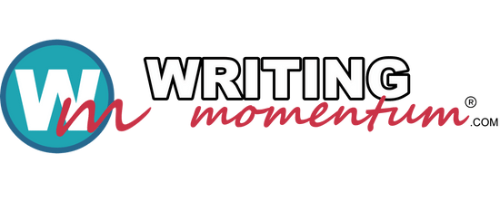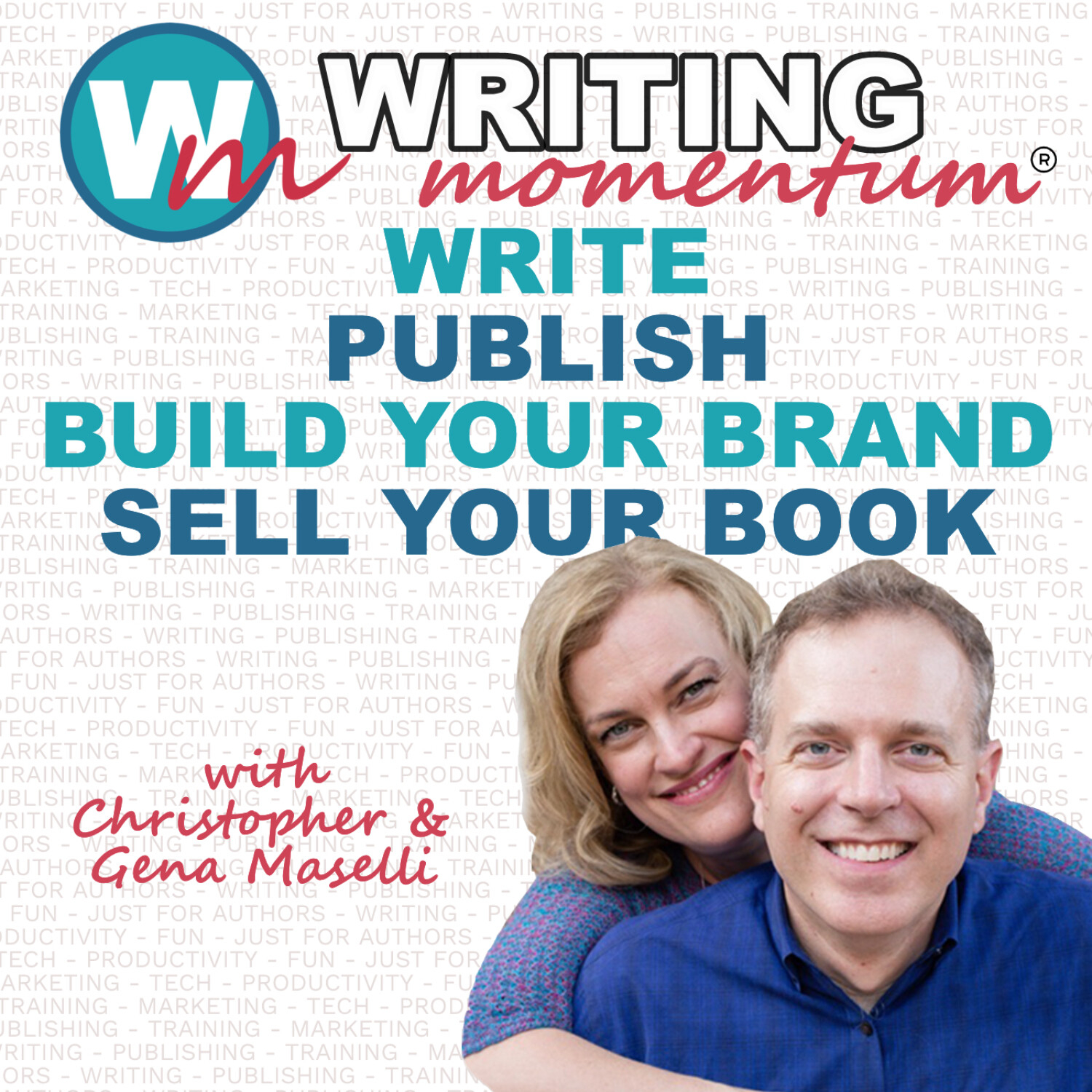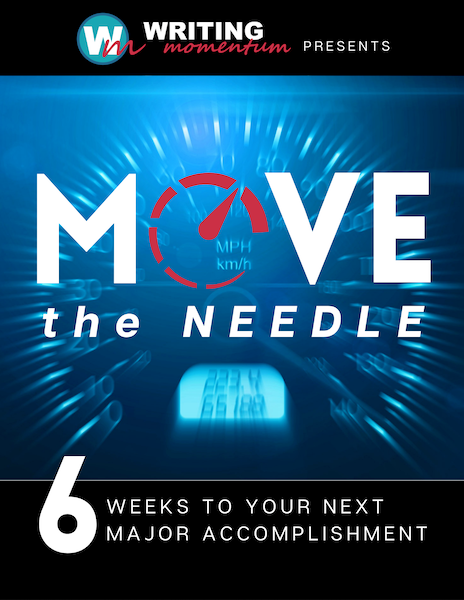Episode 131
Don't Despise the Small Stuff
Hosts Christopher and Gena Maselli discuss the importance of not overlooking the 'small stuff' in writing. They explore how these minor tasks, from honing one’s craft to understanding publishing strategies and building an author brand, contribute significantly towards achieving long-term writing success. Christopher shares his recent experience of bouncing back from illness, emphasizing self-care. The hosts also delve into strategies for dialogue writing, understanding genres, managing copyright, and forming valuable writer connections. Additionally, they highlight the benefits of joining their Writing Momentum membership for ongoing support and community.
- 00:00 Introduction: Does the Small Stuff in Writing Matter?
- 02:40 The Importance of Craft in Writing
- 08:38 Building Your Author Brand
- 12:03 Understanding Publishing Strategies
- 16:11 The Power of Connections in Writing
- 18:06 Join the Writing Momentum Community
- 19:45 Conclusion and Call to Action
LINKS:
- Liz Wilcox's Email Marketing Membership at http://wmdeal.com/liz
- Get your FREE Move the Needle goal-setting for authors ebook at https://www.writingmomentum.com
- Write with us! Join our writing membership and get your book DONE! https://www.writingmomentum.com/membership
Transcript
Does all the little daily stuff in writing really matter?
Christopher:Today we're going to dive into that.
Christopher:Hello and welcome to the Writing Momentum podcast.
Christopher:My name is Christopher Maselli here with my wife, Gena.
Gena:Hi there.
Christopher:How's it going, Gena?
Gena:It's going really well.
Christopher:Yay.
Christopher:Well, hey, I bet you're not despising the small stuff today.
Gena:I am not despising the small stuff because here's the great thing.
Gena:You just got over being really sick, so you are back.
Christopher:Oh yeah, I was out of it for like over two weeks.
Gena:Two weeks.
Christopher:Just, just completely out of it.
Christopher:I tried to work and every time I worked, I think I exhausted myself,
Christopher:did less and yeah, it was not good.
Gena:Yeah, pretty sure that he just refused to stop and felt like he couldn't.
Gena:And so what should have been maybe a four or five day, cold, virus,
Gena:whatever, was probably a good 14 days.
Gena:So we are glad to have you back.
Gena:And that is not anything that I despise at all.
Gena:I'm thrilled you're back.
Christopher:I kind of despise having that cold because even though it does
Christopher:seem like things like, um, you know, colds are small things, they're really not.
Christopher:You got to take care of yourself.
Christopher:You got to take care of them.
Christopher:That's really, it does kind of transition to what we're talking
Christopher:about today because We're talking about not despising the small stuff.
Christopher:When you have some small things in your writing life, you've
Christopher:still got to take care of them.
Christopher:You don't want to despise them because it's part of what the writing life is.
Gena:Yes.
Gena:You know, so many people talk to us about, I want to write this book
Gena:or I want to publish this book.
Gena:And they're focused on that end goal.
Gena:But what they forget about sometimes is the smaller stuff.
Gena:It's those building blocks that help you be really successful and
Gena:write a really good quality book or help you launch that book well,
Gena:or help you build a writing career.
Gena:All of that is built often on that small stuff, those small things.
Gena:So we're going to talk about what some of those small things are
Gena:and they're really not small, but they're, it's not that they're small.
Gena:It's that they're easily overlooked.
Christopher:Yeah.
Christopher:You know, it, it makes me think of, um, uh, who's it?
Christopher:Darren Hardy, right?
Christopher:He's a, he's the guy, he's the editor for Success magazine.
Christopher:He wrote that book called The Compound Effect.
Christopher:And the whole point of the book was essentially all the small things
Christopher:that we do over time you see how they work together and compound together.
Christopher:You're accomplishing big things because of the small things you're doing.
Christopher:And that's kind of what these are.
Christopher:A lot of these may seem like small things, but if you do them on a daily
Christopher:basis, on a regular basis, and don't despise it, but dive into it, you'll
Christopher:find yourself accomplishing big things when it comes to your writing.
Gena:Yes.
Gena:And so we're going to start with this first, what seemingly is the
Gena:small thing, and it really isn't.
Gena:This is what's going to make or break how good your book is.
Gena:And that's just the craft.
Gena:The craft of writing.
Gena:Do not overlook this, this craft of writing.
Gena:There's so much more to it, and there's so much for all of us to learn in it.
Gena:I don't care if you've been writing for 50 years, And you've published
Gena:multiple books and you've won awards and you've sold books.
Gena:There are always going to be techniques that you are going to be
Gena:practicing and things that you're going to be trying to improve on.
Christopher:That's right.
Christopher:You want to fill your life with learning about the craft.
Christopher:Now I have known authors who have been published, who kind of despised the craft.
Christopher:They love the idea of being published, but they didn't
Christopher:want to know how to write well.
Christopher:So they just went ahead and wrote books, despite the fact
Christopher:that they weren't written well.
Christopher:And yes, they were published, but what they ended up with were a lot of
Christopher:books that really wouldn't make much of an impact and certainly wouldn't
Christopher:last the test of time because they weren't written well and they weren't
Christopher:looking to make them written better.
Christopher:Right?
Gena:Right.
Gena:And you and I were just talking about this the other day, we were
Gena:talking about how we, how, what was kind of an, a final project or a
Gena:final piece 20, 30 years ago for us.
Gena:Now, because we have learned to write better, because we've really studied
Gena:the craft of writing and we continue to study the craft of writing, that now
Gena:we're able to push beyond what was that final draft 20 years ago to now it's,
Gena:that may be, you of that final piece is where we end up on at the end of our
Gena:first draft or the end of our, maybe even our revision, our first revision,
Gena:but we know that we can't stop there.
Gena:We have to keep going because we know now what to look for and
Gena:ways that we can make that better.
Gena:Each time, and we know ways that we can make it stronger, we can make it
Gena:tighter, we can make it more concise, or clearer, we can use different, uh,
Gena:techniques within and devices within the writing to make it stronger and
Gena:to make it really jump off the page.
Christopher:So what you're saying is our final draft 20 years ago is about
Christopher:the same quality as our first draft now because we've become better authors.
Christopher:So now our final draft is far beyond what we could have done 20 years ago.
Christopher:And maybe in 20 years from now, that will be our first draft again, right?
Gena:Yes.
Gena:And I, and that's not to say that Chris and I are unique in that.
Christopher:No, hopefully that's that way for any writer.
Gena:Any writer would have that.
Gena:I think there are writers that we know today who are, who are Prolific
Gena:writers who are just really great writers, who if you were to ask them
Gena:what was your work like 20 years ago?
Gena:They would say well, I've grown and I've learned and now I can do this that I
Gena:couldn't do then and it's made, it's just, they've become even better in their craft.
Gena:So we really encourage you study craft and you can do that in a variety of ways.
Christopher:That's right.
Christopher:So you want to understand how to structure your book.
Christopher:That's craft, right?
Christopher:How do, how do you do, how do you do a book structure?
Christopher:How do you create an act one, act two, act three?
Christopher:How do you do a beginning middle end?
Christopher:How do you create character arcs and story arcs and that sort of thing?
Christopher:You want to understand how your genre.
Christopher:Who are you writing for?
Christopher:And what are the conventions of that genre that you are writing?
Christopher:It's different for each genre, and you need to know the rules
Christopher:before you can break them.
Christopher:Then you want to make sure you're able to write clear, right?
Christopher:The more you write, the more concise your writing will become the more
Christopher:precise your writing will become.
Christopher:And then you need to also just understand basic things like copyright, like, right.
Christopher:What can I include in my book and what can I not include because I
Christopher:might be going over the line with, you know, taking someone else.
Christopher:We see this all the time with, for instance, um, um, song quotes.
Christopher:So someone who hasn't had a lot of experience sometimes with writing
Christopher:will put song quotes in their books.
Christopher:And you've got to be careful with that because those are all copywritten and
Christopher:they will come after you for some quotes.
Gena:They will.
Gena:Well, and I'm reminded, you know, yesterday we were part of, I got to
Gena:attend the fiction round table or the writer's round table that we host on
Gena:our membership site with Laurel Thomas.
Gena:She, she does this.
Gena:And she was talking about dialogue, how to write dialogue in a way that it just
Gena:really pops, that it builds a character and helps a character grow so that
Gena:it entertains, so that adds conflict.
Gena:I mean, she was talking about all of that because dialogue, and this is just
Gena:for example, dialogue is one of those areas that if you aren't familiar with
Gena:some of the techniques that you can bring into it, it would be really easy
Gena:to write very boring, bland dialogue that would be kind of like, why is this here?
Gena:Or it's kind of, it kind of slows down the reader.
Gena:It doesn't really move the story along.
Gena:Versus somebody who's really studied that craft Of dialogue who can
Gena:then add so much punch into it.
Gena:There's so many layers in it and it doesn't have to be long.
Gena:That's the thing.
Gena:It doesn't have to be long.
Gena:It can be in just a few short sentences.
Gena:You can give a reader a whole different view on a character.
Gena:Just with that short dialogue and all that is built around that.
Christopher:Yeah, that's right.
Christopher:That's right.
Christopher:All right.
Christopher:So.
Christopher:Work on your craft.
Christopher:Don't despise working on your craft.
Christopher:Second, work on building your author brand and don't despise that.
Christopher:It is so easy to feel frustrated about the fact that as a writer today, you've
Christopher:also got to become a marketer, right?
Christopher:Most of us don't want to be both, but you really need to.
Christopher:If you're an author today, it doesn't matter whether you are self
Christopher:published or traditionally published those traditional publishers today.
Christopher:They will tell you you've got to be the one to market your book.
Christopher:We have friends who've been published by some very large publishing companies and
Christopher:have been surprised how much the those companies are relying on them to come
Christopher:up with their marketing strategy and to execute that marketing strategy and
Christopher:even pay for that marketing strategy.
Christopher:So you've got to understand those things in order to really become
Christopher:successful with your author brand.
Gena:Yes.
Gena:And so when Chris is talking about building your author brand, what
Gena:we mean by building your author brand, just the basic level.
Gena:And this is just to get you started is building your website, collecting names,
Gena:having a lead magnet that will allow, will encourage people to give you their name
Gena:in order to download that lead magnet.
Gena:It means starting on social media, uh, And not starting on social media just to
Gena:build social media numbers, but getting active on social media to drive people
Gena:to your landing page and your website.
Gena:That's what you really want to do.
Gena:And then building your email list and, and building your newsletter and starting that
Gena:newsletter and having it go out regularly.
Christopher:So let's, let's just touch on this for a moment because
Christopher:this is a hotspot you just brought up.
Christopher:Almost all authors we talk to do not want to dive into the social media realm
Christopher:because they look at it and they think, Ah, they despise that small stuff, right?
Christopher:They look at it and they think, What a pain in the rear it's going to
Christopher:be to try and put posts out every day and get people to read them.
Christopher:Look, you don't have to be magical on social media.
Christopher:In fact, most People that we talked to who are successful with their
Christopher:social media strategy did not start with a social media strategy.
Christopher:They started with an email strategy.
Christopher:They started with a in person strategy.
Christopher:They started with their website They started with their lead magnet and social
Christopher:media came a little further down the road where they could spend a little bit of
Christopher:time with it, but also where they could say look we're not going to try and be
Christopher:everything to everyone on social media.
Christopher:We're just going to focus maybe on one channel and we're going to make sure
Christopher:everything points back to that lead magnet because getting people on your
Christopher:email is just the most important thing.
Gena:So when you're building that author brand on the social media, like Chris is
Gena:talking about, really spend time making your profile really strong and linking
Gena:that profile to your actual website so that when people on social media find you,
Gena:they will go to your profile, read about you, but then they can find your website
Gena:and then sign up for your newsletter.
Gena:That's kind of the, the lead that you're kind of leading them towards.
Gena:That's what you're wanting them to do.
Gena:You want them on that newsletter, and we've talked about this a lot,
Gena:so you can go back and look it.
Gena:We've done several episodes on newsletters, but that is where
Gena:the gold is because that is when you can directly speak to your
Gena:readers who want to know about your projects and about you as a writer.
Christopher:Yeah.
Christopher:The next thing you want to be sure that you don't despise are
Christopher:understanding publishing strategies.
Christopher:Okay.
Christopher:Let's, and let's just take this from just the understanding the
Christopher:difference between traditional publishing and self publishing.
Christopher:Or even hybrid publishing, which is kind of a combination between the two.
Christopher:We, just this last week, I received an email from someone who said, I really want
Christopher:to get published, I've got my novel almost done, but I don't want to self publish.
Christopher:I want to know how to get traditionally published.
Christopher:Okay?
Christopher:I understand that.
Christopher:But my question back was, why not?
Christopher:Why don't you want to become self published?
Christopher:Not that you should, but why?
Christopher:And their answer was because they didn't know anything about it.
Christopher:Okay.
Christopher:You've got to know about these two different avenues because what we
Christopher:have found as self publishing becomes more and more and more common, it's
Christopher:pretty much just as common now as traditional publishing, is that
Christopher:becoming self published is for many authors actually easier and more
Christopher:effective than traditional publishing.
Christopher:It's maybe not as glamorous.
Christopher:But if you're willing to put aside the glamour, you will find
Christopher:that you can actually make more money, have more control, and be
Christopher:available in more places sometimes even than traditional publishing.
Christopher:So you want to understand those publishing strategies so that you can be making good
Christopher:decisions when it comes to your writing.
Christopher:And really it doesn't take a lot to learn about these things, right?
Christopher:You can take a course we have in our membership.
Christopher:We have a course all about the differences between traditional
Christopher:hybrid and self publishing.
Christopher:And it's pretty easy to learn.
Christopher:Well, one hour you can learn all the different differences between those three
Christopher:things so that you can start making really quality decisions about those, right?
Gena:Yeah.
Gena:And here's the thing, whether you do traditional or self published like
Gena:Chris said, part of the small stuff is you've got to learn how to market
Gena:regardless of which way you decide to go.
Gena:And I know that there are people that say, like, like this person you
Gena:were talking to who said, I don't want to do this because I don't know.
Gena:You're gonna have to learn that.
Christopher:You gonna do it either way.
Gena:Whether you do it, Whichever way you go, you're going to have to learn.
Gena:Now with a traditional publisher, they're gonna hire the editors.
Gena:They're going to take it and have it designed.
Gena:They're going to decide on the title.
Gena:They're going to decide on how it's laid out.
Gena:They're gonna decide on how they launch it.
Gena:They are going to take those choices away from you, which is fine because
Gena:they are in the business of making money and this is their specialty.
Gena:But on the, when it comes to the marketing side, you're still, once that book is
Gena:out there, they're still going to be coming to you saying, okay, it's time
Gena:for you to do these kinds of promotions.
Gena:Or you said in your proposal that you would do this, this, and this, and
Gena:now we're looking for you to do those.
Gena:Or.
Gena:You know, whatever it is, they're going to be looking for you to step up.
Gena:It is no longer the world where you put a book out there and it just goes and
Gena:you don't have to do anything with it.
Gena:Unless you are a well known author who already has a following.
Gena:But I will tell you, Chris, a lot of the authors that I am reading
Gena:right now are self published authors.
Christopher:Oh yeah, yeah, a good number of them.
Gena:And they are, they're, they're kicking it.
Christopher:Oh yeah.
Gena:They are doing, they're crushing it.
Gena:They are doing a great job.
Christopher:We know authors now who have television shows.
Christopher:They could easily be traditionally published and they choose not to
Christopher:because they, it's easier and makes more money and they have more control
Christopher:than if they traditionally published.
Christopher:And so.
Gena:And we're not saying this because we're saying, well,
Gena:everybody needs to be self published.
Gena:That's not it at all.
Gena:We just want you to be informed of what the landscape is like so that
Gena:you can make an informed decision, regardless of which way you decide to go.
Christopher:Yeah.
Christopher:We believe in both kinds of publishing.
Christopher:We have both been published in both ways, so we believe in both.
Christopher:We just want you to be knowledgeable.
Christopher:And then finally, we want you to make connections.
Christopher:Remember, writing is no longer a solitary venture.
Christopher:This is not about going to your writing cabin, writing, writing,
Christopher:writing, being all alone, and then your book becomes a hit, right?
Christopher:It sounds wonderful, but the way to get your writing done today in today's
Christopher:distracted world, right, where there's so many things that are begging for
Christopher:your attention, is to make connections.
Christopher:Write with other writers, right?
Christopher:Do co writing sessions together, attend writers conferences.
Christopher:Those kinds of things can make a huge difference in your life.
Christopher:So much so that we have found that the accountability from that
Christopher:has been a game changer for us.
Gena:Yes.
Gena:And you know, I actually know of an author, very successful self published
Gena:author could be traditionally published, but she is crushing it on her own.
Gena:And so she's, decided to stick with self publishing, but one of the things
Gena:that she has done, which I think is just genius, is she and some of her,
Gena:um, friends, who are also authors, have created kind of a marketing hub together
Gena:so that when one comes out, the others are promoting their book to their newsletters.
Gena:And when another comes out, they're promoting it to the other people.
Gena:And so there, it's a collaborative effort that they're doing.
Gena:And I believe that they get together pretty regularly, multiple times a
Gena:year, even though they live very far apart, they get together for multiple
Gena:times a year, to discuss marketing options and what their strategy is
Gena:going to be as a collective unit.
Gena:And I just applaud them for that.
Gena:Like what a great idea so that the marketing isn't
Gena:just falling on one person.
Gena:But they are working together to make sure that they are all successful.
Christopher:Yeah, that's right.
Christopher:Hey, if you want to have someone to write with, we would love to have you join
Christopher:us in the Writing Momentum membership.
Christopher:It's 25 a month.
Christopher:It is not expensive.
Christopher:It's not even a, uh, dinner out, right?
Christopher:I mean it's less than a dinner out, a little more than a fast food, maybe.
Christopher:Um, and here's what you get when you join with us.
Christopher:First of all, We write together every Wednesday at noon central
Christopher:with a whole group of people.
Christopher:We get together, we have a short training, and then we work on
Christopher:our individual projects together.
Christopher:It's just a way to have an appointment on your calendar
Christopher:that says, I'm going to be there.
Christopher:I'm going to write together with you.
Christopher:If you can't make that time, it's okay.
Christopher:We record the trainings.
Christopher:Speaking of trainings, we have literally dozens.
Christopher:Dozens of video recorded trainings with worksheets on a lot of
Christopher:them inside our membership hub.
Christopher:You get access to them all.
Christopher:These are trainings we used to sell individually for a
Christopher:lot more than $25 a piece.
Christopher:Now they're all in there together.
Christopher:We also have Laurel Thomas, who's an award winning fantasy author.
Christopher:She's been on this podcast.
Christopher:She teaches roundtables.
Christopher:These are in depth courses on specific subjects like Gena mentioned earlier.
Christopher:I have been, I've gotten a master's in writing.
Christopher:My master's courses, many of them weren't as in depth as what
Christopher:Laurel teaches in this course.
Christopher:If you want master's level quality training, come to Laurel's courses.
Christopher:And then we have some other exciting things coming up.
Christopher:Uh, we're going to actually save some of that to tell you about it
Christopher:later, but I think you're going to love being a part of this membership.
Christopher:There is no commitment.
Christopher:You can come in for one month if you want, or you can come in for 12.
Christopher:We would love to have you so that you're not writing alone.
Gena:Yes.
Gena:Thank you so much for joining us on this podcast.
Gena:We do not take it lightly.
Gena:We know that your time is important and your time is valuable.
Gena:And if you're like us, you're super busy, so we don't take it for granted.
Gena:We just thank you so much.
Gena:And if you would, um, would you please share this?
Gena:If you know of anybody who is struggling with some of this small stuff, they,
Gena:you know, have written that book or they're in the process of writing that
Gena:book and they feel like they've gotten stuck, share this podcast with them.
Gena:We want to encourage as many writers as possible because like Chris said, together
Christopher:we have writing momentum.
Christopher:Bye-Bye.





